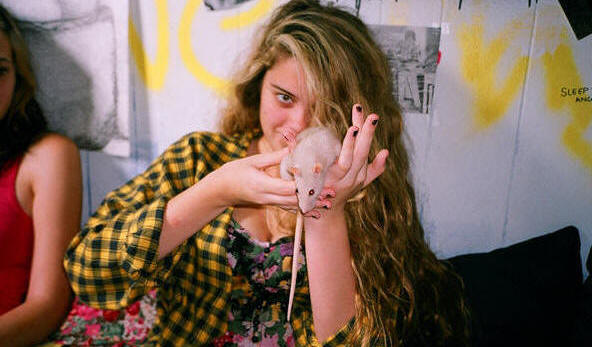Monday, February 21, 2011
PHOTOS |
COMING SOON|
EXAMINER.COM FILM ARTICLES
||HOME
MOVIE REVIEW
Putty Hill
The Life And Times Of
Baltimore's Poor

Sky Ferreira as Jenny
in "Putty Hill", directed by Matt Porterfield.
Cinema Guild
by
Omar P.L. Moore/PopcornReel.com
 FOLLOW
FOLLOW
Monday,
February 21, 2011
Matt Porterfield's "Putty Hill" is a small independent drama that marries
fiction and documentary efficiently if questionably. Mr. Porterfield was
born and raised in Baltimore, and his film immerses us in the kinds of people
he's known: poor and working class teens and pre-teens, as well as adult
figures. The film opened last Friday in New York City.
The camera absorbs about two dozen characters, all of whom form varying
close-knit alliances in suburban Baltimore. They unite around the death of
a friend/acquaintance named Cory (Cody Ray), a youngster who overdosed on drugs.
"He used drugs for most of his life," one of Cory's friends recalls early on.
Some of them think they knew Cory; to others even in death he remains an enigma.
"Putty Hill" has its strengths, most of which don't emerge until after the
fifty-minute mark. After that point is a distinct scene of note: a fixed
camera capturing a tattooist applying a tattoo to a friend while music is
playing. It's one of the most naturalistic, mellow and authentic moments
of the entire film.
In attempting to carve out a comfort level with its subjects -- involved in a
series of casual interactions and situations -- "Putty Hill" feels less real
than it does confident. The film's achieves a texture of its neighborhood
and inhabitants, but it's the style of the film itself that confounds. In
having a tentative-sounding voice frequently asking questions of some of the
characters during parts of the film's first half, "Putty Hill" distracts itself
and the audience from completely engaging with its people, placing a barrier
between them and us. I was removed from them, especially when they became
talking heads for the director's digital video camera.
Mr. Porterfield clearly intended to make a film about the youth of Baltimore but
much of his film is dedicated to quizzing them rather than just letting us get
to know them through their actions. This investigatory filter hurts the
film's own cause, undoing some of its more credible sequences. The
director tries to eat his cake and keep it intact at the same time with the
documentary-like inquiry and fiction film. As a result "Putty Hill" rings
a little false. Mr. Porterfield's film flourishes without its repetitive
questioner. The director appears to take the hint, abandoning the mystery
voice just before the hour-mark.
Sky Ferreira, a relative newcomer to the big screen, is given lead billing as
Jenny, who has an estranged relationship with her father Spike (Charles Sauers).
Ms. Ferreira doesn't fare poorly but her Jenny is far from the film's most
interesting character. That title belongs to Zoe (Zoe Vance). Ms.
Vance has an introductory scene and is cut right from the neighborhood she
represents. Even in her Q&A she has a presence and fearlessness that lacks
in many of the other portrayals.
Larry Clark has convincingly chronicled the youth class (or underclass) in
potent ways. In "Kids", his highly disturbing 1995 film marking the debuts
of Chloe Sevigny and Rosario Dawson, Mr. Clark threw the actions of New York
City kids at us without filters or apologies. The results were shattering.
There was no pretension or reluctance. Gus Van Sant ("Elephant", "Paranoid
Park") and Harmony Korine ("Gummo") have also gone for the gusto when
chronicling youth trapped in adolescent strains. The man-child and
women-child of these films were mostly fictional but also convincing, even
though the atmospheres created in some of them may not have been real.
There weren't any additional devices utilized to authenticate the teenagers'
experiences in these films. The actors told their stories through their
actions.
"Putty Hill" is admirable in some ways, approximating a reality, but only one
crafted through its environment and not its overall substance as a narrative
piece. Some of the film feels pretentious and overdone, especially the
film's final scene and the closing sequence. Mr. Porterfield dedicates his
film to Sara Jane Gerrish.
"Putty Hill" needed more dedication to a consistent storytelling style that
would have made the film even more resonant than the director shows.
With: James Siebor Jr., Dustin Ray, Catherine Evans, Virginia Heath, Casey
Weibust, Drew Harris, Marina Siebor, Jeff Ichniowski, Ian Burke, Joe Mooney.
"Putty Hill" is not rated by the Motion Picture Association of
America. The film's running time is one hour and
26 minutes. "Putty Hill" makes its way around the country to several
cities including Baltimore next month for one week, and on April 8 in Los
Angeles at the Laemmle Sunset 5 Theatre.
 FOLLOW
FOLLOW
SUBSCRIBE TO THE POPCORN REEL MOVIE
REVIEWS RSS FEED
